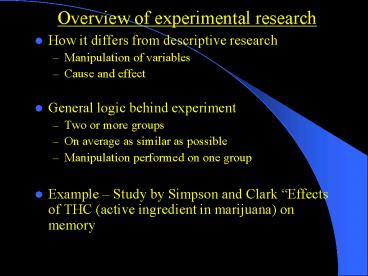Overview of experimental research - PowerPoint PPT Presentation
1 / 16
Title:
Overview of experimental research
Description:
Overview of experimental research. How it differs from descriptive research ... Experimental group remembers 2 items more than control ... – PowerPoint PPT presentation
Number of Views:24
Avg rating:3.0/5.0
Title: Overview of experimental research
1
Overview of experimental research
- How it differs from descriptive research
- Manipulation of variables
- Cause and effect
- General logic behind experiment
- Two or more groups
- On average as similar as possible
- Manipulation performed on one group
- Example Study by Simpson and Clark Effects of
THC (active ingredient in marijuana) on memory
2
Components of an experiment
- Independent and dependent variables
- Variables in our example
- Control and experimental group
- How do they differ
- How are subjects assigned
- Importance of random assignment
3
Why is randomization your friend
- Best way to make it so that ON AVERAGE the
control and experimental groups are as similar as
possible on any given measure - Not a guarantee
- Not randomizing introduces potential confounds
- Example Suppose didnt randomize in THC study
- Imagine following data
- Average weight of control group 150 lbs
- Average weight of experimental group 190 lbs
- Experimental group remembers 2 items more than
control - Manipulation of THC confounded with weight
4
Randomization example
5
Analyzing results
- Once data is collected (both descriptive and
experimental) need to be analyzed - Measures of central tendency
- Purpose
- Mean
- Median
- Mode
- Measures of variability
- Range
- Standard deviation
6
Understanding standard deviations
- On average, how much does each score differ from
the mean? - First find mean of a set of scores
- Next subtract each score in the set from the mean
- Square each difference (gets rid of negative
numbers) - Add all the squared differences (analogous to
computing mean) - Divide by 1 less than total number of scores
- Take the square root of the result
7
Example
- Scores on first exam 10, 40, 90, 50
- First find mean (10 40 90 50)/4 47.5
- Subtract mean from each score then square
- (10 47.5)2 (40-47.5)2 (90-47.5)2
(50-47.5)2 3275 - 3275/3 1091.6
- Square root of 1091.6 33
- Standard deviation of the above scores is about
33
8
Importance of standard deviation
- Standard deviation tells how variable your data
set is - When you report a mean MUST MUST report standard
deviation - The standard deviation tells you how
representative the mean is of your data set - The effects of outliers on the mean
9
Deciding whether to curve exam
- Exam 1 10, 10, 10, 50 Mean 20
- Exam 2 10, 20, 25, 25 Mean 20
- Conclusion? Because means are the same must
either curve both or curve neither. Sorry no
curve - Standard deviation exam 1 20
- Standard deviation exam 2 7
- Relationship between mean and standard deviation
10
(No Transcript)
11
Summary
- Psychology is a science because relies on
scientific method - Importance of data collection
- Descriptive methods of collecting data
- Naturalistic observations, case studies,
interviews, surveys, correlations - Experiment as method for gathering data
- Independent and dependent variables
- Control and experimental group
- Random assignment
- Data analysis
- Measures of central tendency
- Measures of variability
12
Ethics in research
.
13
General ethical guidelines
- Do no harm
- Principle of informed consent
- Participation is voluntary
- No coercion
- Free to withdraw
- Compensation is NOT contingent on completion
- Importance of debriefing
14
Who enforces the guidelines
- Institutional review board (IRB) at each
University - Professional societies
- APA, APS
- Journals
- Granting agencies
- NIH, NSF
15
What about studies using animals
- Why use animals
- Need to protect physical comfort/health of
animals - What about psychological health of animals
- Example of Harlowe and importance of comfort vs.
sustenance - Get all food from wire mother
- Allowed to spend as much time with cloth mother
as want
16
(No Transcript)




























![AMSc Research Methods Research approach IV: Experimental [1] PowerPoint PPT Presentation](https://s3.amazonaws.com/images.powershow.com/8084663.th0.jpg?_=20160828056)


